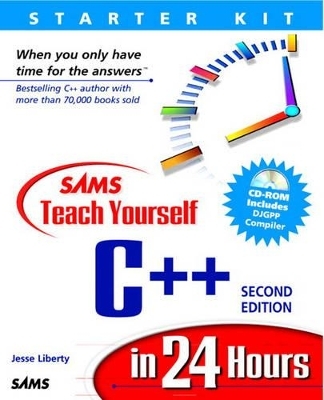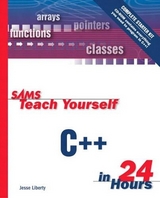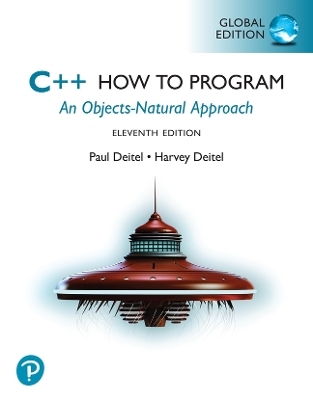
Sams Teach Yourself C++ in 24 Hours
Sams Publishing
978-0-672-31516-9 (ISBN)
- Titel erscheint in neuer Auflage
- Artikel merken
Sams Teach Yourself C++ in 24 Hours, 2nd Edition is a hands-on guide to the C++ programming language. Readers are provided with numerous examples of syntax and detailed analysis of code, an excellent guide for beginning programmers. In just 24 hours, readers will learn about such fundamentals as managing I/O, loops and arrays, object-oriented programming, templates, and creating C++ applications- all in well-structured and easy-to-follow lessons. Lessons provide sample listings, complete with sample output and an analysis of the code, to illustrate the topics of the day. Sams Teach Yourself C++ in 24 Hours, 2nd Edition has been updated to the new ANSI/ISO C++ Standard and includes coverage of namespaces, the Standard Template Library and distributed computing. This edition is non-compiler specific and has received a double technical edit to ensure code integrity.
Jesse Liberty, President of Liberty Associates, Inc. is the author of Sams Teach Yourself C++ Programming in 21 Days,(1st and 2nd editions) and the original Sams Teach Yourself C++ in 24 Hours. Jesse authors a monthly column in C++ Report, one of the most widely distributed C++ programmer reference periodicals. Jesse was a software architect for Xerox, a distinguished software engineer for AT&T and Vice President of Citibank¿s Development Division. Jesse Liberty has published several books on the topic of C++ and object-oriented design.
Introduction. Who Should Read This Book. Conventions. PART I - INTRODUCING C++. HOUR 1. Getting Started. Why C++ Is the Right Choice. Preparing to Program. C++, ANSI C++, Windows, and Other Areas of Confusion. Compiling and Linking the Source Code. The Development Cycle. HELLO.CPP--Your First C++ Program. Compile Errors. Summary. Q&A. Hour 2. The Parts of a C++ Program. The Parts of a Simple Program. Comments. Functions. Summary. Q & A. Hour 3. Variables and Constants. What Is a Variable? Defining a Variable. Creating More Than One Variable at a Time. Assigning Values to Your Variables. typedef. When to Use short and When to Use long. Wrapping Around in unsigned Integers. Enumerated Constants. Summary. Q&A. Hour 4. Expressions and Statements. Statements. Expressions. Operators. Combining the Assignment and Mathematical Operators. Increment and Decrement. Precedence. Nesting Parentheses. The Nature of Truth. Relational Operators. The if Statement. Use Braces in Nested if Statements. Logical Operators. Relational Precedence. More About Truth and Falsehood. Summary. Q&A. Hour 5. Functions. What Is a Function? Declaring and Defining Functions. Local Variables. Global Variables. Function Statements. Function Arguments. Parameters Are Local Variables. Return Values. Default Parameters. Overloading Functions. Summary. Q&A. PART II - CLASSES. Hour 6. Basic Classes. Creating New Types. Classes and Members. Accessing Class Members. Private Versus Public. Implementing Class Methods. Constructors and Destructors. Summary. Q&A. Hour 7. More about Classes. const Member Functions. Interface Versus Implementation. Where to Put Class Declarations and Method Definitions. Inline Implementation. Classes with Other Classes as Member Data. Summary. Q&A. Hour 8. Advanced Program Flow Looping. while Loops. do...while Loops. for Loops. switch Statements. Summary. Q&A. PART III - MEMORY MANAGEMENT. Hour 9. Pointers. What Is a Pointer? Why Would You Use Pointers? The Stack and the Free Store. Summary. Q&A. Hour 10. Advanced Pointers. Creating Objects on the Free Store. Deleting Objects. Accessing Data Members. Member Data on the Free Store. The this Pointer. Whats the this Pointer For? Stray or Dangling Pointers. const Pointers. Summary. Q&A. Hour 11. References. What Is a Reference? Creating a Reference. Using the Address of Operator on References. What Can Be Referenced? Null Pointers and Null References. Passing Function Arguments by Reference. Understanding Function Headers and Prototypes. Returning Multiple Values. Summary. Q&A. Hour 12. Advanced References and Pointers. Passing by Reference for Efficiency. References as an Alternative. When to Use References and When to Use Pointers. Dont Return a Reference to an Object that Isnt in Scope! Returning a Reference to an Object on the Heap. Pointer, Pointer, Who Has the Pointer? Summary. Q&A. PART IV - POWER TOOLS. Hour 13. Advanced Functions. Overloaded Member Functions. Using Default Values. Choosing Between Default Values and Overloaded Functions. The Default Constructor. Overloading Constructors. Initializing Objects. The Copy Constructor. Summary. Q&A. Hour 14. Operator Overloading. Operator Overloading. Conversion Operators. Summary. Q&A. Hour 15. Arrays. What Is an Array? Array Elements. Writing Past the End of an Array. Fence Post Errors. Initializing Arrays. Arrays of Objects. Multidimensional Arrays. A Word About Memory. Arrays of Pointers. Declaring Arrays on the Free Store. A Pointer to an Array Versus an Array of Pointers. Pointers and Array Names. Deleting Arrays on the Free Store. char Arrays. strcpy() and strncpy(). String Classes. Summary. Q&A. PART V - INHERITANCE AND POLYMORPHISM. Hour 16. Inheritance. What Is Inheritance? Private Versus Protected. Constructors and Destructors. Overriding Functions. Summary. Q&A. Hour 17. Polymorphism and Derived Classes. Virtual Methods. Summary. Q&A. Hour 18. Advanced Polymorphism. Problems with Single Inheritance. Abstract Data Types. Summary. Q&A. Hour 19. Linked Lists. Linked Lists and Other Structures. A Case Study. The Component Parts. What Have You Learned, Dorothy? Summary. Q&A. PART VI - SPECIAL TOPICS. Hour 20. Special Classes and Functions. Static Member Data. Static Member Functions. Containment. Friend Classes. Friend Functions. Pointers to Functions. Pointers to Member Functions. Summary. Q&A. Hour 21. The Preprocessor. The Preprocessor and the Compiler. Seeing the Intermediate Form. Using define. Inclusion and Inclusion Guards. Defining on the Command Line. Macro Functions. String Manipulation. Predefined Macros. Summary. Q&A. PART VII - ADVANCED TOPICS. Hour 22. Object-Oriented Analysis and Design. The Development Cycle. Simulating an Alarm System. PostMaster: A Case Study. Summary. Q&A. Hour 23. Templates. What Are Templates? Parameterized Types. Template Definition. Using Template Items. The Standard Template Library. Summary. Q&A. Hour 24. Exceptions and Error Handling. Bugs, Errors, Mistakes, and Code Rot. Exceptions. Using try Blocks and catch Blocks. Next Steps. Style. Next Steps. PART VIII - APPENDIXES. Appendix A. Operator Precedence. Appendix B. C++ Keywords. Appendix C. Binary and Hexidecimal. Appendix D. Third-Party Software. Index.
| Erscheint lt. Verlag | 11.3.1999 |
|---|---|
| Verlagsort | Indianapolis |
| Sprache | englisch |
| Maße | 188 x 232 mm |
| Gewicht | 878 g |
| Themenwelt | Mathematik / Informatik ► Informatik ► Programmiersprachen / -werkzeuge |
| ISBN-10 | 0-672-31516-5 / 0672315165 |
| ISBN-13 | 978-0-672-31516-9 / 9780672315169 |
| Zustand | Neuware |
| Haben Sie eine Frage zum Produkt? |
aus dem Bereich

